2022

South Dakota State University President Barry Dunn was named the recipient of the Harold W. McGraw Jr. Higher Education Prize for his work with the Wokini Initiative.
The McGraw Family Foundation and the University of Pennsylvania’s Graduate School of Education named three leaders in the field doing groundbreaking work in pre-K–12 classrooms, on university campuses and in learning science research, respectively.
The Wokini Initiative was launched in 2016 during Dunn’s inaugural address with the purpose to better serve South Dakota’s tribal members by improving access to the benefits of higher education. The initiative works to increase collaboration and partnerships with tribes and tribal organizations; provide sustainable financial resources that include student scholarship; increase the American Indian student population on campus to mirror the population in the state; improve Indigenous student success through cultural awareness and build a new American Indian Student Center in the heart of campus.
Funding for the Wokini Initiative has come through private donations to the SDSU Foundation and revenue generated by land as part of the South Dakota Permanent Trust Fund. To date, more than $25 million in philanthropic gifts have been provided to Wokini and with Dunn’s advocacy, the U.S. Congress supported The New Beginning for Tribal Students grant program as part of the 2018 Farm Bill. The program appropriates $5 million annually among the 50 states in the U.S.
The private donations have included more than $9.8 million in endowments and a $4 million lead gift to build the American Indian Student Center in 2020. Additionally, the Wokini Initiative received grants from the Bush Foundation and the Margaret A. Cargill Philanthropy.
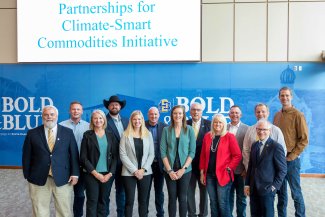
South Dakota State University today announced that it will receive up to $80 million for the Partnerships for Climate-Smart Commodities Initiative. The USDA is investing up to $2.8 billion in 70 selected projects under the first pool of funding opportunities.
The USDA’s website lists the approximate funding ceiling for SDSU at $80 million, making it the largest grant ever received by the university. Final funding levels will be determined in the coming months.
Titled “The Grass is Greener on the Other Side: Developing Climate-Smart Beef and Bison Commodities,” SDSU’s project will create market opportunities for beef and bison producers who utilize climate-smart agriculture grazing and land-management practices. The project will guide and educate producers on climate-smart practices most suited for their operations, manage large-scale climate-smart data that will be used by producers to improve decision-making and create market demand for climate-smart beef/bison commodity markets.
Other major partners on the project include Millborn Seeds, Buffalo Ridge Cattle Company, AgSpire, Tanka Fund, Cold Creek Buffalo Company, SDSU Extension, the SDSU Center of Excellence for Bison Studies, the National Bison Association, Texas A&M University, Yard Stick, C-Lock and SmartScore.ai.
In addition to SDSU, only five other universities are listed as the lead on projects projected at $50 million in funding or higher—Virginia Polytechnic Institute and State University, Clemson University, Texas A&M AgriLife Research, Regents of the University of Idaho and Oregon State University.
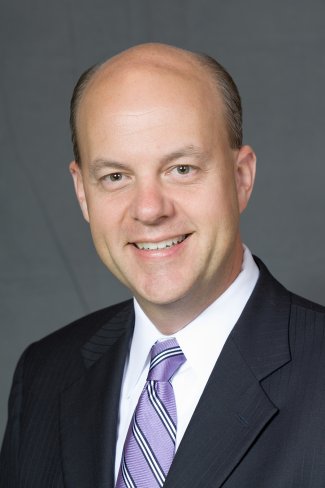
South Dakota State University President Barry Dunn announced today that Vernon Brown has been hired as the associate vice president for external affairs, pending approval by the South Dakota Board of Regents.
The position will lead SDSU Connect and the university’s work with key stakeholders, collaborations and strategic initiatives in the Sioux Falls area.
Brown is a 1990 graduate of SDSU.
SDSU Connect, an initiative launched by Dunn, was created following a year of discovery and connecting with Sioux Falls leaders, educators and community members. The initiative involved a 40-member task force with campus leaders visiting and learning the needs of the state’s largest city and conversely the city’s leaders going to the Brookings campus to better understand its role as the state’s first land-grant university and the resources it provides to the communities of South Dakota.
Brown’s responsibility as the associate vice president for external affairs will be to foster Sioux Falls’ unprecedented growth by aligning SDSU’s expertise and resources to have the highest impact for the Sioux Falls area.
With 79 different languages spoken throughout the Sioux Falls School District, a wide range of businesses and industries and a large population, the Sioux Falls region aligns well with SDSU’s mission of providing access to the benefits of higher education for all.
Brown has 20 years of business executive leadership at SDN Communications. He also served eight years on the Sioux Falls City Council, and before that worked as a television reporter. He and his wife, Tami ’94, own and operate The Spice & Tea Exchange of Sioux Falls.
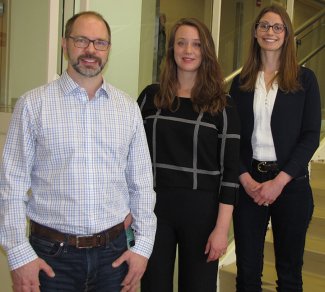
Biomedical research being done at South Dakota State University, specifically in the area of inflammation, will be advanced through a $10.8 million, five-year federal grant.
The award from the National Institutes of Health will fund work in the newly created Center of Biomedical Research Excellence and is potentially renewable for a second and third five-year period.
The project will be led by the center's director, Adam Hoppe and build biomedical research at SDSU. It will fund the research of current faculty members, bring on new researchers and staff and add equipment to allow for more sophisticated research.
The new center is a progression of the South Dakota BioSystems Networks and Translational Research center that was created in 2013.
Then the state awarded the center $12 million over six years when it was selected as the South Dakota Established Program to Stimulate Competitive Research submission to the National Science Foundation Research Infrastructure Improvement Track I program. That funding ended in 2018, but smaller grants and university investment have kept the work active.
South Dakota State University had seven graduate programs ranked following a survey of online programs by U.S. News & World Report. The 2023 U.S. News Best Graduate Schools rankings are designed to help prospective students research more than 2,000 graduate programs.
For the first time in years, U.S. News published fresh academic reputation rankings for graduate programs in social work; doctoral program rankings in the social sciences and humanities fields of economics and psychology; and doctoral program rankings in the science fields of math, statistics, biological sciences, computer science, chemistry and earth sciences. U.S. News has also included its first-ever ranking of doctoral programs in biostatistics because opportunity in this field is expected to grow in the coming years.
SDSU was ranked: #59 in Pharmacy (tie); #80 in Rehabilitation Counseling (tie); #96 in Statistics (tie) #117 in Sociology.
The data for the rankings in the disciplines came from statistical surveys of more than 2,150 programs and from reputation surveys sent to more than 23,200 academics and professionals, conducted in fall 2021 and early 2022.
Previously announced by U.S. News, SDSU had the following rankings:
- #147 in Top Public Schools (tie);
- #288 in National Universities (tie);
- #369 in Top Performers on Social Mobility (tie);
- #41 in Best Online Bachelor’s in Psychology Programs (tie);
- #44 in Best Online Master’s in Nursing Programs (tie);
- #96 in Nursing (tie);
- #183 in Best Undergraduate Engineering Programs (tie) at schools whose highest degree is a doctorate;
- #242-321 in Best Online Master’s in Education Programs ;
- #246 in Best Online Bachelor’s Programs (tie);
- #179 in Mathematics (tie); #194 in Chemistry (tie), and
- #286 in Biological Sciences (tie).
The Freedom Scholarship, South Dakota’s first public/private partnership for a need-based scholarship, is entering its pilot year with $5.1 million to be distributed to the 13 eligible South Dakota institutions. Commitments from First PREMIER Bank / PREMIER Bankcard, Sanford Health, Avera Health and the State of South Dakota led by Gov. Kristi Noem '11 spurred the scholarship fund’s creation in 2021.
With gifts and commitments now totaling $175 million, the Freedom Scholarship Endowment is the state’s largest financial need-based scholarship endowment. Managed by the South Dakota Community Foundation, this funding is in an endowment that will continue to provide scholarships in perpetuity, with the goal of growing to at least $200 million.
In a statewide effort to encourage students of all economic backgrounds to live and work in South Dakota after graduation, this allocation event marks the beginning of the endowment’s impact on the state’s educational and economic structures. Freedom Scholarship funds are included as part of the eligible institutions’ financial aid package offerings, with no additional application required.
2021
POET, a global leader in the production of bioproducts, South Dakota State University and South Dakota Mines held a groundbreaking ceremony today for the POET Bioproducts Institute at the Research Park at SDSU. The institute will serve as an innovation center for the development of low-value agricultural and forestry materials into high-value bioproducts such as specialty animal feeds and bioplastics that are degradable.
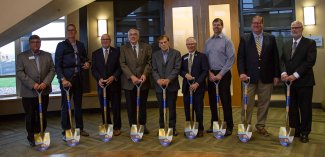
“We are convinced that this specialized laboratory will provide our region with enormous capacities to drive economic growth through applied biotechnology,” said SDSU President Barry Dunn. “The idea of this institute started with a challenge from the private sector and grew into a collaborative partnership between many organizations.”
The 45,000-square-foot facility is made possible through $20 million in legislative funding, $5 million from POET and $2 million from South Dakota Corn. Furthermore, the South Dakota Soybean Research and Promotion Council will provide $500,000 annually for five years—a total of $2.5 million—and the state committed a yearly $500,000 for operational costs.
“POET has longstanding partnerships with South Dakota’s leading engineering universities in supporting our state and driving one of its most essential industries: agriculture,” said Jeff Broin, POET founder and CEO. “Now more than ever, we must continue to develop cutting-edge innovations in low-carbon biofuels and bioproducts in order to protect our planet. The POET Bioproducts Institute will be a catalyst in driving processes and technology that will lead our nation’s conversion from a fossil-based economy to an ag-based economy.”
The facility will allow collaboration on the next generation of bioproducts. SDSU strengths are in feedstock and preprocessing, as well as the downstream animal feed testing trials. Mines provides expertise on the bioprocessing side, developing biomaterials through the Composites and Polymer Engineering Lab and the Composite and Nanocomposite Advanced Manufacturing–Biomaterials Center. POET will provide innovation around commercial scale development.
“This project is a very visible example of two South Dakota universities working together, with industry, to make life better in South Dakota,” said Jim Rankin, president of South Dakota Mines. “These new product lines will create jobs, which will keep our college graduates and graduates from the technical colleges in South Dakota. We at Mines are excited to see the new innovation that will be created.”
The facility is expected to produce more than $6 million annually from research expenditures that include employee salaries from grant-funded research. Estimates also include more than $4 million annually toward South Dakota industries accessing pre-pilot scale-up lab and bioprocessing services.
South Dakota State University announced a goal to raise $500 million in its third comprehensive campaign in the school’s history.
Bold & Blue is the largest philanthropic fundraising initiative ever in South Dakota, with a target amount of nearly twice the funds raised.
More than $340 million was committed during the leadership phase, which began Jan. 1, 2017. The leadership phase is designed to test the interest of donors; it is common practice for a campaign to shift into the public phase once 60% to 70% of the goal is reached.
Bold & Blue is a people-centered campaign that focuses on investments in four over-arching areas: Our People, Our Places, Our Traditions and Our Innovations.
The largest portion of the campaign will focus on people: scholarships for students, endowments for faculty, and leadership and research positions to attract and retain top academic talent.
The campaign includes an investment on new and revitalized facilities. The largest and most-prominent facility in the places category is the renovation of SDSU’s nearly 50-year-old basketball arena. First Bank & Trust has made a $20 million naming gift to champion that project, which is estimated to cost $50 million.
The Pride of the Dakotas Marching Band, Hobo Day, Little International and Prairie Repertory Theatre are among the SDSU traditions targeted for current gifts and endowments to provide sustainable financial support.
The innovations align with the university’s premier land-grant status and continued growth of precision agriculture, bioprocessing and research in the development and delivery of drugs.
A heavy emphasis is on growing the amount of funding for scholarships and faculty support, particularly in the form of endowments that are invested and provide revenue for the university in perpetuity.
SDSU’s first campaign, Visions for the Future, exceeded its $50 million goal by $2 million during a five-year campaign (1994-1998). The second campaign, It Starts With State, had a goal of $200 million. That campaign raised $255 million in just over six years.
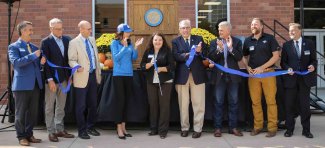
After breaking ground in fall 2018, a public grand opening ceremony for the Raven Precision Agriculture Center was held Saturday, Sept. 11, at 2:00 p.m. on the South Dakota State University campus in Brookings. Following the ceremony, attendees were invited to take tours of the new $46.1 million facility that was supported by South Dakota stakeholder groups, industry partners and legislative leaders.
“We are here to celebrate an innovative ecosystem that will not only impact the future of SDSU, but will also positively impact our ability to serve this state and region, and to provide educational and hands-on experiences which will lead to our students feeding and sustaining a hungry world,” said John Killefer, South Dakota Corn Endowed Dean of the College of Agriculture, Food and Environmental Sciences.
The center brings the Departments of Agricultural and Biosystems Engineering and Agronomy, Horticulture and Plant Science under one roof, which were previously housed in separate buildings on campus. This innovative environment will allow for increased student-faculty interaction, industry networking opportunities, inter-departmental research collaboration and hands-on learning.
“With the opening of this new facility, we as students will be able to expand our network to those outside of our area of study,” said Rosalyn Madsen, junior precision agriculture student from Franklin, Minnesota. “This new building offers advanced opportunities for we as students as well as faculty, to enhance our knowledge in areas of production agriculture, and allows room for growth as precision technologies constantly advance and change.”
The new facility measures 122,694 sq. ft. and includes 15 teaching labs, six hands-on labs, 12 research labs, 22 collaborative spaces and office space for more than 50 graduate students.
“We have an obligation to lead the next revolution in agriculture,” said Dan Rykhus, Chief Executive Officer of Raven Industries, which the center was named after. “Facilities matter – it’s more than just brick and mortar. We must have people come together to make sure agriculture continues to advance, and the Raven Precision Agriculture Center will make that happen.”
The center features a 4,245 sq. ft. high bay area with a 3-ton overhead crane that provides students with real-world experience working on modern, full-size equipment and machinery.
“This facility, this catalyst for launching precision agriculture forward, is proof that active leadership by individuals and commodity groups works,” said Mike Jaspers, Interim Executive Director of South Dakota Corn. “Our agricultural industry needs to continue to adapt and provide leadership and support in order to ensure we are preparing our graduates to be successful. We need to continue to grow by ensuring we have the facilities and spaces to perform cutting edge research to benefit our agricultural industry, and through the power of young people who attend fine institutions such as SDSU, the industry looks to these students to be the next leaders in our state.”
Additionally, SDSU is one of few universities in the United States to offer dynamometer equipment for teaching and learning, which is adjacently located to the high bay area. In this space, students have the ability to measure rear wheel and PTO horsepower at the same time.
“This grand facility is where innovation will happen, and new technologies will be developed, allowing farmers to be more profitable, our environment healthier, and food supplies more reliable for generations to come,” said Barry H. Dunn, SDSU President. “Our students, now and in the future, who walk the halls of this building, will go on to create new businesses, lead organizations, and conduct research that will forever change the way we grow, harvest, and deliver the world’s food.”
In celebration of the grand opening, SDSU hosted the second Precision Agriculture Bowl football game vs. Lindenwood following the event, which resulted in a 52-7 win for the Jackrabbits.
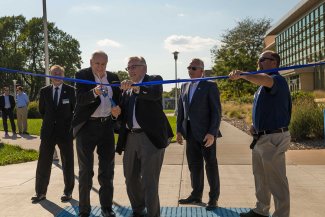
South Dakota State University’s Jerome J. Lohr College of Engineering is offering a bachelor’s degree in concrete industry management. The degree offering comes after the CIM National Steering Committee and the North Central Region patrons selected SDSU through a six-month selection process.
The NSC and the NCR patron groups are combined resources to provide SDSU approximately $1.5 million over five years to develop the degree program and assist in employing a CIM program director, recruiter and laboratory manager.
“We are excited to be selected as the university to fill the needs of the concrete industry, not only in South Dakota, but throughout the entire North Central Region," said SDSU President Barry Dunn. "The program supports our mission as a land-grant university of addressing workforce needs in the communities of South Dakota and beyond. These Jackrabbits will become knowledgeable in concrete technology and techniques, capable of managing people and systems, skilled in technical sales and expected to advance to industry leadership positions.”
The CIM program was developed in 1995 at Middle Tennessee State University as a public/private partnership between the university and the concrete industry. Expansions of the CIM program, over the past 25 years have included the New Jersey Institute of Technology, California State University-Chico and Texas State University.
Thor Becken, NCR patrons chairman, said the concrete industry recognized the need for the CIM program in the Midwest. Once the decision was made to develop a CIM program in the region, it took two years of planning and gaining industry member support, before a search committee began interviewing various universities about potential interest in offering a CIM degree.
“The selection committee made up of NSC and NCR members overwhelmingly agreed that SDSU was the most logical and best choice for us,” said Eugene Martineau, CIM NSC executive director. “SDSU’s prior experience with public/private partnerships, combined with how the Lohr College of Engineering stresses developing programs that engage industry needs, were critical in our decision making. It was obvious working with industry is not something that is new to the university. During our visit to SDSU, it was evident the president and provost down through the dean and department heads were all-in for establishing a CIM program."
Becken said the program is intended to develop graduates who possess both technical knowledge and management expertise capable of being hired into entry- or middle-level management positions. The longer-term goal of CIM is to develop the future leaders of the concrete industry.
“That’s important because our industry, like many, is aging. Higher-level managers are starting to retire. We’re looking for next generation of leaders to come in,” Becken said. “I think most people would be surprised to learn about the variety of career paths available within our industry. There are many professional, skilled and technical positions where employees get to see tangible results of their work.”
According to Art Thompson, NCR site selection committee chairman, there were multiple career openings last year for every CIM graduate.
“These jobs include substantial starting salaries as well as full complements of benefits,” Thompson said. “For any student who is considering a career in a construction related industry, I would highly encourage them to learn more about the CIM program.”
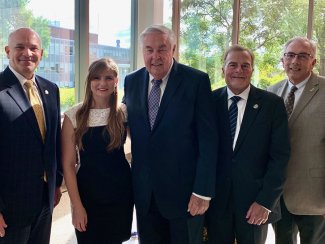
The namesake of the Jerome J. Lohr College of Engineering at South Dakota State University has committed $5 million to create an endowed dean position in the college, President Barry H. Dunn announced Thursday afternoon in the Chicoine Architecture, Mathematics and Engineering Hall.
The endowment will provide $200,000 or more annually in perpetuity for current and future deans to use strategically for the benefit of the Lohr College of Engineering. The endowment also brings stature that will be critical in the retention and recruitment of strong leaders for the college.
“If a forensic scientist studied SDSU’s campus, they would see Jerry Lohr’s fingerprints everywhere,” Dunn told a crowd of 150. “Jerry has impacted SDSU in literally countless ways. Some are very grand and highly visible. Many are more subtle, but ultimately just as important. In this university’s 140-year history, Jerry Lohr stands as a giant.”
Lohr is a 1958 civil engineering graduate, coming from the farming community of Raymond. He went on to create and operate two successful California-based companies: a custom-home building business and J. Lohr Vineyards and Wines.
Lohr purchased his first vineyard in 1972. Today, J. Lohr Vineyards and Wines farms approximately 4,000 acres of estate vineyards in Paso Robles and Monterey County, as well as 35 acres in the St. Helena appellation of Napa Valley.
Provost Dennis Hedge recounted Lohr’s involvement in every renovation, expansion or construction of engineering facilities over the past two decades, starting with the revitalization and expansion of Crothers Engineering Hall and Solberg Hall in 2001 and 2002, respectively. That continued with two phases of Daktronics Engineering Hall and construction of the Chicoine Architecture, Mathematics and Engineering Hall, which opened for classes in fall 2015.
“The renaissance, so to speak, started in 1983,” Hedge said. “That was the year Jerry returned to campus and walked through Solberg Hall. He taught classes there—as an undergraduate. He saw the same worn tile floor that he remembered from 25 years earlier. He saw a building that was worn-out. Jerry, himself, identified that as his motivation to get involved.”
Lohr joined the SDSU Foundation board in 1988 and has served on that continuously since then. He has chaired and co-chaired the first two comprehensive campaigns for the university. He is among the top benefactors in SDSU history.
The College of Engineering was formally named the Jerome J. Lohr College of Engineering in 2013 in recognition of his giving and leadership.
In announcing Lohr’s new $5 million commitment, President Dunn said, “This gift is yet another demonstration of his incredible generosity and an additional example of his extraordinary vision.”
Endowed faculty positions have become a point of emphasis at SDSU because of the financial resources, prestige and stability they bring. They range from endowed professors to endowed chairs to endowed deans. Bruce Berdanier will be the first holder of the Lohr Endowed Dean.
Paris Marcy, a senior civil engineering major from Minnetonka, Minnesota, introduced Lohr at the announcement. “I have learned how to be a leader and what it means to be part of a community, and most of all, I have learned how to harness my engineering judgment to solve the complex problems we face today,” said Marcy, who was recently selected as one of six students nationwide to receive a student leadership award from the American Society of Civil Engineers.
“We may not have a lot in common. But as a soon-to-be civil engineering graduate from South Dakota State, I hope it leads me to the type of success that Mr. Lohr has achieved,” she continued. “And not just as a professional, but as a person who cares, gives back, makes a difference and transforms lives.”
2020
President Dunn announced two dual credit scholarships for high school juniors and seniors in South Dakota, including one for low-income students.
The Jackrabbit Access College Early Scholarship will be available to qualified high school juniors and seniors from low-income families. The Jackrabbit Journey Scholarship will provide financial assistance to all students who enroll at SDSU following high school after earning dual credits from SDSU.
“These scholarships represent the fundamental mission of South Dakota State University by providing access to the educational benefits of higher education for the citizens of South Dakota,” Dunn said during the announcement. “We want the young people in the state to have the opportunity to explore all options for postsecondary education. These scholarships will open more doors to participate in higher education. More importantly, getting these students to see early on in high school that they can be successful in college helps them make informed decisions about their exciting futures.”
President Donald Trump signed the 2020 Agriculture Appropriations Bill with a historic provision that will provide full funding to support American Indian students seeking the benefits of higher education at land-grant universities, which include tribal colleges. The bill passed both the House and the Senate prior to Trump signing.
New Beginning for Tribal Students authorizes the USDA to match state funding for programs at land-grant colleges or universities that support American Indian students. The authorization is capped at $5 million per year and $500,000 per state.
“This is a milestone for American Indians throughout the United States as they look to the future and the opportunities afforded to attend, and graduate, from some of the best colleges and universities in the country,” Dunn said. “The Wokini Initiative’s initial pledge to develop and provide more sustainable financial resources for SDSU was a critical step to creating greater access to higher education for our native students, giving them a better chance to be successful."
2019
President Dunn and POET founder and CEO Jeff Broin announced a $2 million gift for the Raven Precision Agriculture Center at South Dakota State University.
The gift also includes SDSU and POET enhancing research partnerships through dedicated POET office space at the Research Park at South Dakota State University to help facilitate new, groundbreaking collaborations; and the two organizations partnering to develop academic programs in bioprocessing so SDSU graduates will have a robust understanding of how biofuels and agriculture can drive change across the globe.
SDSU continues to increase its commitment to precision agriculture, including being the only university to offer both a precision agriculture major and minor and the construction of the new Raven Precision Agriculture Center on campus will position Jackrabbits to lead the way in making positive change that impacts future generations across the globe.
Dunn was selected to deliver the 2019 William H. Hatch Memorial Lecture during the annual meeting of the Association of Public and Land-grant Universities.
The lecture is one of three rotating lectures presented by NIFA and APLU, which honor three historic Land-Grant University figures: Justin Smith Morrill, William Henry Hatch and Seamen A. Knapp. The lecture commemorates the foresight of William Henry Hatch in leading the movement to establish national support for agricultural science at LGUs.
Dunn’s lecture, “Wokini—A Morrill Obligation to Create a New Beginning,” focused on his Wokini Initiative. The lecture provided a forum to challenge thinking about university research programs, especially in agriculture, and proposes opportunities and challenges for the future.
The Bush Foundation awarded the 2019 Bush Prize for Community Innovation to five organizations with a track record of successful problem-solving in their communities.
“The Bush Foundation’s investment in the Wokini Initiative will provide significant opportunities to our students, faculty and staff,” Dunn said. “Being recognized by a prominent organization like the Bush Foundation indicates the progress we are making with the Wokini Initiative.”
Bush Prize winners receive a package that includes promotional support and materials and an unrestricted grant equal to 25 percent of the organization’s prior fiscal year budget, up to $500,000. The Foundation received 81 applications for the 2019 Bush Prize. Three panels of community members chose the winners from their respective states.
The Bush Prize celebrates organizations that are extraordinary not only in what they do but in how they do it. This year’s winners demonstrate a pattern of working inclusively, in partnership with others, to make the region better for all. The Bush Prize, now in its seventh year, is awarded annually in Minnesota, North Dakota, South Dakota and the 23 Native nations that share the same geography.
3M Foundation and 3M Brookings committed $50,000 to South Dakota State University for the Wokini Initiative. The funds will be used to support five-year, $5,000 renewable scholarships to qualifying American Indian students.
Dale Tidemann, plant manager of 3M Brookings, presented a $50,000 check to SDSU President Barry Dunn in support of 3M’s commitment to helping underserved students succeed in science, technology, engineering and mathematics.
The Wokini Initiative at South Dakota State University is a collaborative and holistic framework to support American Indian student success and Indigenous Nation-building. Wokini, which means “a new beginning” in Lakota, started when Dunn took office in 2016. The funds will be used toward SDSU’s commitment of offering five-year, $5,000 renewable scholarships to qualifying American Indian students.
Dunn was appointed to the NCAA Presidential Forum for three years, representing The Summit League. The forum is comprised of presidents and chancellors from each of the 32 NCAA Division I conferences. Dunn's appointment continues through Aug. 2022.
“Intercollegiate athletics play a critical role in not only higher education, but society overall," Dunn said. "It is important that as presidents of colleges and universities we continue our leadership at the NCAA level and provide the necessary oversight to bring together the importance of athletics and the mission of higher education."
The forum assists the NCAA Division I board of directors in accomplishing its strategic mission in the Division I governance structure and helps ensure that the NCAA core values involving presidential leadership of intercollegiate athletics at the campus, conference and national level is achieved.
The updated facility features a Biosafety Level 3 space to contain dangerous pathogens, offers greater security against bioterrorism as well as upgraded air, water and electrical systems. A drive-up window for dropping off samples was also added to provide clients with easy access to the lab and to enhance biosecurity.
ADRDL is the only veterinary diagnostic laboratory in the state accredited by the American Association of Veterinary Laboratory Diagnosticians. In addition, the laboratory is an integral member of the National Animal Health Laboratory Network, a network of diagnostic laboratories across the U.S. that help detect nationally significant animal diseases such as influenza, Foot and Mouth Disease, African Swine Fever and other foreign animal diseases. Expertise in detecting agents of food-borne illness is important in the ADRDL's role as a regional laboratory for the Food Emergency Response Network.
The laboratory also participates through the FDA Genome “Trakr” Program for detection of pathogens in food and the USDA Veterinary Laboratory Investigation Response Network to help the center of Veterinary Medicine investigate potential problems with regulated products such as animal feeds and animal pharmaceuticals.
South Dakota State University was named to the inaugural Forbes list of America’s Best-in-State Employers. South Dakota State University was ranked No. 2 in the state.
The ranking included companies that employ at least 500 people in their U.S. operations.
“This is a tremendous recognition for South Dakota State University, but more importantly it’s a reflection of the dedicated people who work here and are part of the Jackrabbit family,” said Dunn. “I’m honored to be president of this great university and have the opportunity to work with thousands of employees throughout the state who are dedicated to SDSU being a premier land-grant university.”
South Dakota State University was listed as one of the top-performing institutions in terms of exceeding expected six-year graduation rates, according to analysis of 368 colleges and universities done by The New York Times and the Urban Institute’s Center on Education Data and Policy. An article on the topic, The College Dropout Crisis, appeared in May 23 editions.
With incoming classes exceeding 2,000 full-time, first-year students, SDSU was ranked in the largest school category, which included public and private institutions. South Dakota State was expected to have a graduation rate of 69 percent but posted a rate of 74 percent. To create the expected graduation rates, student characteristics included various factors, including ACT or SAT scores.
The analysis compared colleges that enroll similar students, regardless of size and being a public or private status. The analysis counted students as graduates as long as they received a bachelor’s degree within six years of starting college, even if they ultimately graduated from a different college.
SDSU faculty and staff will develop a series of professional development opportunities to gain a broader understanding of American Indian history, culture and current issues. As part of the university’s Wokini Initiative, the professional development series will help foster a culturally responsive and supportive campus environment for American Indian students to support the goal of their increasing retention and graduation rates.
The Wokini Initiative’s strategic plan identifies professional development for faculty and staff as a means to increase American Indian enrollment. The training will focus on the areas of land and environment, identity and resiliency, culture and language, kinship and harmony, oral tradition and story, sovereignty and treaties and way of life and development.
The professional development opportunities are made possible by funding from Margaret A. Cargill Philanthropies. The grant provides $1 million over three years.
2018
Working with Congressional Leadership in Washington, D.C., and university leadership, Dunn helped spearhead two important items within the 2018 U.S. Farm Bill. The areas include educational support for Native American students and provisions that will ensure research and extension funding for soil health.
“The provisions in the farm bill pertaining to support for Native American students and soil health are critical to our state, the region and even the world,” Dunn said. “The educational access for American Indian students in South Dakota will provide economic advancement in communities throughout the region, while research in soil health will benefit agriculture around the globe.”
The CHS Foundation, funded by charitable gifts from CHS Inc., committed a $1.5 million grant to support the South Dakota State University precision agriculture program and construction of the new Raven Precision Agriculture Center on campus.
“The CHS Foundation is committed to supporting projects that cultivate opportunity for students interested in the agriculture industry,” said Nanci Lilja, president, CHS Foundation. “By supporting the precision ag program at SDSU, there will be more qualified graduates entering the agriculture industry.”
The gift aligns with CHS priorities around ensuring that educating the next generation of agricultural leadership includes technology and tradition. The CHS Foundation is focused on developing a new generation of agriculture leaders for lifelong success.
Avera Health and SDSU partnered on a scholarship program for undergraduate American Indian students at SDSU as part of the Wokini Initiative. Morgan Ducheneaux, a freshman nursing major and member of the Cheyenne River Sioux Tribe was the inaugural recipient.
There was one $5,000 scholarship in 2018, building each year with two $5,000 scholarships in 2019, three in 2020, four in 2021, and five scholarships in 2022. Avera is investing $75,000 over five years. Wokini-supported students are given the resources and access to academic, personal, health and financial wellness knowledge needed to succeed at SDSU and in life after graduation.
Along with the scholarship, recipients also benefit from experiential learning, internship opportunities and a coordinated mentorship program. Through this mentor network, Avera Wokini scholars will be connected to an Avera Health leader for the purpose of gaining valuable guidance on career opportunities.
SDSU leadership held a groundbreaking ceremony for the $46.1 million Raven Precision Agriculture Center before hosting the inaugural Precision Agriculture Bowl football game against Indiana State. The building project is supported by South Dakota stakeholder groups and legislative leaders.
The facility will have 129,000 square feet of floor space that will be able to house modern precision farm equipment and will provide collaborative learning spaces for student design projects. Flexible space will be available to scientists from a variety of departments and industry can collaborate in research and education.
Classrooms and laboratories will foster innovation and collaboration across the Department of Agricultural and Biosystems Engineering and the Department of Agronomy, Horticulture and Plant Science in the College of Agriculture, Food and Environmental Sciences, as well as the Jerome J. Lohr College of Engineering.
SDSU is the first land-grant university in the country to offer both a bachelor's degree and minor in precision agriculture.
In October 2017, Dunn announced a $4 million gift from a private donor to build a new American Indian Student Center on the SDSU campus. The following year, the project broke ground.
The new facility will be nearly 12,500 square feet and will provide office space, meeting rooms, multipurpose rooms, technology resources, student support space and academic support space. Its primary function would be dedicated to student support programming and services. The American Indian Student Center is committed to providing support to Native American students and its function involves nation building and work to encourage students to recognize and develop their voice and help prepare Native students to respond to the call to return home.
The AISC offers personalized support for prospective and current students that focuses on areas, such as retention advisement, advocacy, social, cultural and academic programming, organizational student leadership development, community and professional referrals, financial aid guidance, enrollment and registration assistance, peer mentoring and peer tutoring.
SDSU launched Imagine 2023, the university's strategic plan that promotes its mission to offer a rich academic experience in an environment of inclusion and access through inspired, student-centered education, creative activities and research, innovation and engagement that improve the quality of life in South Dakota, the region, the nation and the world.
SDSU's vision is to be a premier land-grant university that is embedded in its core values of being people-centered, promoting creativity, operating with integrity, being committed to diversity and achieving excellence.
Raven Industries and South Dakota State University announced a $5 million gift from Raven to support construction of a new Precision Agriculture Facility on the SDSU campus.
“This generous gift by Raven will help transform the state of South Dakota into a global leader within an expanding precision agriculture industry," Dunn said. “The proposed facility will enhance innovation and the development of educational programs that will deliver applications to enable data-driven decisions in precision farming, ranching and conservation. It will promote the type of collaboration between faculty, students and industry experts that will change agriculture and make our region and world a better place. Together, Raven and South Dakota State University are working to build a strong future and precision agriculture is that future.”
The gift was an investment in the current and future workforce of South Dakota. Raven and SDSU strongly believe the state will be well-served by this partnership. Bringing this exceptional facility to South Dakota will allow the state to lead the nation in precision agriculture education, research and extension. From state and economic benefits to the development of a highly trained workforce, South Dakota is well-positioned to benefit from precision agriculture technology and adoption.
2017
The state’s only animal health laboratory was built in 1967 and additions were made in 1993. New upgrades and expansions were needed to meet today’s industry animal health, biosafety and environmental safety needs.
The upgrade was supported by several agricultural groups including the South Dakota Pork Producers Council, South Dakota Farm Bureau, South Dakota Cattlemen’s Association, South Dakota Association of Cooperatives, South Dakota Dairy Producers, South Dakota Poultry Industries Association, South Dakota Conservation Districts, South Dakota Soybean Association, South Dakota Grain & Feed Association, South Dakota Veterinary Medical Association and South Dakota Auction Markets Association.
2016
The South Dakota Board of Regents appointed Barry Dunn as South Dakota State University’s 20th president in April 2016, the fourth alumnus to hold the position. Dunn served as dean of the College of Agriculture and Biological Sciences prior to the appointment. He holds a Ph.D. and a master’s degree in animal science and a bachelor’s degree in biology, all from SDSU. In September 2016, Dunn was inaugurated.
"My vision builds on the foundation of the land-grant mission and belief that accessibility to the benefits of education supports a dynamic society," Dunn said in his inauguration speech. "To achieve that mission, we must continually renew our university to build an exciting future.
"My vision is that we have prepared ourselves and our university so that when all children are ready to build their future, SDSU is ready for them … with a dynamic, strong, exciting array of academic, athletic and artistic programs, in a safe, healthy and stimulating atmosphere, a place that builds opportunity and opens doors they can’t begin to dream of.
"I stand before you, pledging with every part of me that this place will be a place where—regardless of ethnicity, race, belief system or station in life—an imagination can be the foundation of a future, with the beacon on top of our campanile, lighting the way."

